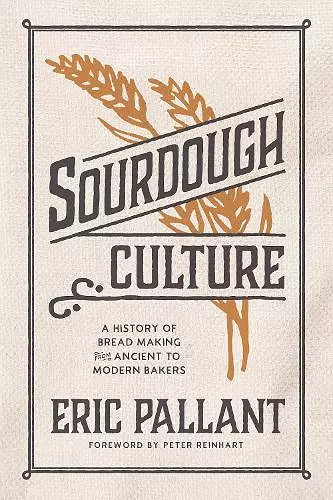Sourdough Culture
A History of Bread Making from Ancient to Modern Bakers
Format:Hardback
Publisher:Surrey Books,U.S.
Published:28th Oct '21
Currently unavailable, our supplier has not provided us a restock date

Sourdough bread fueled the labor that built the Egyptian pyramids. The Roman Empire distributed free sourdough loaves to its citizens to maintain political stability. More recently, amidst the Covid-19 pandemic, sourdough bread baking became a global phenomenon as people contended with being confined to their homes and sought distractions from their fear, uncertainty, and grief. In Sourdough Culture, environmental science professor Eric Pallant shows how throughout history, sourdough bread baking has always been about survival. Sourdough Culture presents the history and rudimentary science of sourdough bread baking from its discovery more than six thousand years ago to its still-recent displacement by the innovation of dough-mixing machines and fast-acting yeast. Pallant traces the tradition of sourdough across continents, from its origins in the Middle East’s Fertile Crescent to Europe and then around the world. Pallant also explains how sourdough fed some of history’s most significant figures, such as Plato, Pliny the Elder, Louis Pasteur, Marie Antoinette, Martin Luther, and Antonie van Leeuwenhoek, and introduces the lesser-known—but equally important—individuals who relied on sourdough bread for sustenance: ancient Roman bakers, medieval housewives, Gold Rush miners, and the many, many others who have produced daily sourdough bread in anonymity. Each chapter of Sourdough Culture is accompanied by a selection from Pallant’s own favorite recipes, which span millennia and traverse continents, and highlight an array of approaches, traditions, and methods to sourdough bread baking. Sourdough Culture is a rich, informative, engaging read, especially for bakers—whether skilled or just beginners. More importantly, it tells the important and dynamic story of the bread that has fed the world.
Praise for Sourdough Culture:
"If you only ever read one book about bread, this is the book. Expansive, authoritative, charming, fascinating, delicious, and leavened with stories, Pallant's Sourdough Culture is a must read." —Rob Dunn, author of Delicious: The Evolution of Flavor and How It Made Us Human
“Perfect for history buffs, food science nerds and bread eaters alike. It will inevitably have sourdough-proficient readers feeding their starters in preparation for a baking bonanza and is bound to inspire novices to begin a sourdough journey of their own." —Shelf Awareness
“For the passionate baker with a serious itch to know more about the history, culture, and intricacies of sourdough, I highly recommend the well-researched and well-written Sourdough Culture by Eric Pallant. Eric's scholarly approach to understanding the nuances of bread will inspire both the novice and experienced baker.” —Daniel Leader, author of Bread Alone, Local Breads, Living Bread and founder and chair of Bread Alone bakery
“Pallant deftly covers a wide breadth of time and place in Sourdough Culture, interweaving experts’ research with his own travels, research, and experiments.” —Pittsburgh City Paper
“Ferment your mind with Sourdough Culture. A necessary read for anyone obsessed with sourdough. Rich in history and crafted with the precision each baker strives for in their crumb. If you’re not already in love with bread making, you will be after this book.” —Iliana Regan, author of Burn the Place and founder and owner of Milkweed Inn
“It’s a great book.” —WNYC’s Science Friday
“It is an enjoyable read. . . I love the book.” —Linda Pelaccio, A Taste of the Past
“Sourdough Culture is a tour de force of social, economic, political, and gastronomic history that is both meticulously researched and highly readable. This is a book that not only presents sourdough culture in rich detail, but also connects each bite of bread we take with the hundreds of generations that have come before us.” —Stanley Ginsberg, author of The Rye Baker
“Pallant elegantly proves that sourdough matters! A truly fascinating read—this book serves as the cultural and historic sourdough prism for anyone with a miniscule interest in the innumerable magnitudes of importance that sourdough culture has offered its eaters and civilizations throughout millennia. Sourdough Culture transforms and levels your perception of breaking bread and, essentially, your own intimate interaction with what seems to be just four basic ingredients." —Jonas Astrup, master baker at Meyers, Copenhagen
“Bread is one of the greatest human inventions; it has allowed [humankind] to build empires and become the society we are today. More than 250 generations have passed on the knowledge of baking. Testing out some of the recipes Eric shares in this book [has been] fun and makes [one] realize that the breads that we make today are probably the best in history. If you like baking, history, and science, this book will likely keep you busy. It did with me!” —Karl De Smedt, sourdough librarian at the Puratos Sourdough Library
"More than a history of bread baking, Sourdough Culture is a culinary mystery story leavened with Pallant's passion, charm, and devotion to the ageless allure of the risen loaf." —Aaron Bobrow-Strain, author of White Bread: A Social History of the Store-Bought Loaf
ISBN: 9781572843011
Dimensions: unknown
Weight: unknown
320 pages